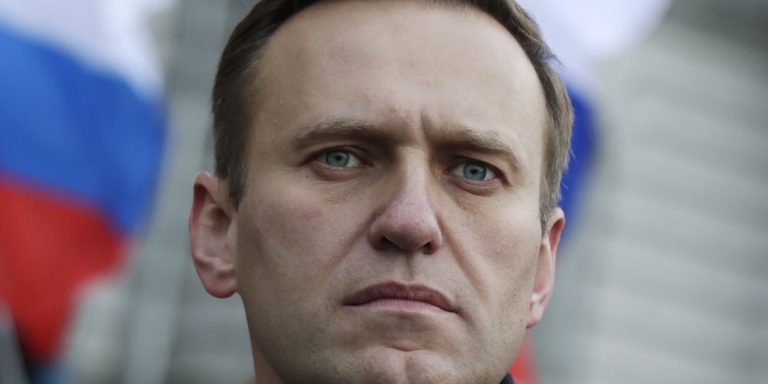INTELBRIEF
September 17, 2020
IntelBrief: Russia Ruthlessly Silences Critics and Uses Energy to Blackmail Europe

Bottom Line Up Front
- Alexei Navalny, Russian President Vladimir Putin’s most prominent critic, was poisoned in a Russian airport on August 20, and is currently recovering in Berlin.
- Despite the EU’s talk of sanctions against Russia, Moscow remains relatively undeterred and continues to plan brazen intelligence operations, including assassination attempts, on European soil.
- Russian energy supplies delivered through the Nord Stream 2 pipeline are a source of leverage for Putin, who sees this is a critical tool in his campaign to blackmail European nations into quiescence.
- While completing the Nord Stream 2 pipeline project makes economic sense, politically it is far more fraught in Berlin and other European capitals.
Alexei Navalny, the Russian opposition leader who remains among Russian President Vladimir Putin’s most prominent critics, was suspected of being poisoned with a chemical agent known as Novichok in Siberia on August 20, and is currently being treated in Berlin. His condition has recently improved and he has been removed from a medically-induced coma. Sweden and France have confirmed that Navalny was poisoned by Novichok, a poison commonly deployed by Russia against its enemies. European political leaders agreed that the use of Novichok violates the 1993 arms control treaty, the Chemical Weapons Convention, and the offense is thus legitimate grounds for international sanctions. The United Kingdom, Germany, and the Organization for the Prohibition of Chemical Weapons (OPCW) have previously worked together in an attempt to hold Russia accountable for its prior breaches, including the 2018 poisoningof former Russian military officer Sergei Skripal and his daughter Yulia in Salisbury, England. In response, the UK and 28 other countries expelled a total 158 Russian diplomats. Nevertheless, Moscow remained relatively undeterred and continued to plan brazen intelligence operations, including assassination attempts, on European soil.
German Foreign Minister Heiko Maas suggested that Germany may seek to respond to Navalny’s case through sanctions to the Russian Nord Stream 2 gas pipeline. The pipeline runs from Russia to Germany through the Baltic Sea, supplying critical energy resources to Europe while bypassing Ukraine. Maas commented, ‘I hope the Russians won’t force us to change our position regarding the Nord Stream 2 [pipeline],’ however, German Chancellor Angela Merkel has disputed any possible action disturbing the pipeline. Exploitation of German domestic natural gas reserves as an alternative to the pipeline is unlikely—further production requires fracking, banned in 2016, with a loophole allowing special permissions that have not yet been granted. Analysis by environmental research firms suggests that energy shortfalls will be filled by imports, with existing pipelines providing sufficient quantities of natural gas to fill future demand.
The Nord Stream 2 is owned by Gazprom, a Russian state-owned company. Critics of Germany’s continued relationship with Putin argue that funding a Gazprom project funnels money directly to the Russian state. By extension, Germany’s reluctance to alter its stance toward Russian energy perpetuates Russia’s rogue actions in Europe and fails to hold the Kremlin accountable for its continued violations of international law. Nord Stream 2 goes against both energy and policy interests of many EU member states. Moreover, it fails to align with the bloc’s long-term strategy of achieving an Energy Union by undermining open competition and pricing through a sharp influx of Russian oil.
Opposition to the pipeline is not merely limited to the EU. Indeed, the United States has sanctioned the project since 2019. Many Western countries fear an increased dependence on Russia, based on the most recent share of Russian imports in both the EU and German natural gas market, pegged at 40% in 2018. In addition, the incoming gas from the pipeline contradicts Germany’s targets to decrease foreign gas imports under the Energiewende initiative passed in 2018. Energiewende is a plan to transition Germany to an environmentally sustainable energy strategy. German citizens consistently list climate change as one of the most important challenges facing their country, and indeed, the region and world as a whole. Despite German reservations, the Nord Stream 2 pipeline is nearly complete. While completing the pipeline project makes economic sense, politically it is far more fraught. Finishing its construction is likely to alienate Western allies in Europe and the United States. While Navalny’s poisoning may not spur the withdrawal of Russian diplomats like the situation in 2018, the Chemical Weapons Convention could expand its writ to bring the issue in front of the U.N. Security Council or General Assembly, thus putting additional scrutiny on the Nord Stream 2 as a bargaining tool with Russia.